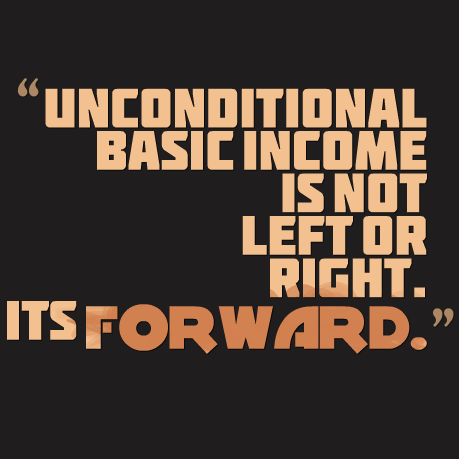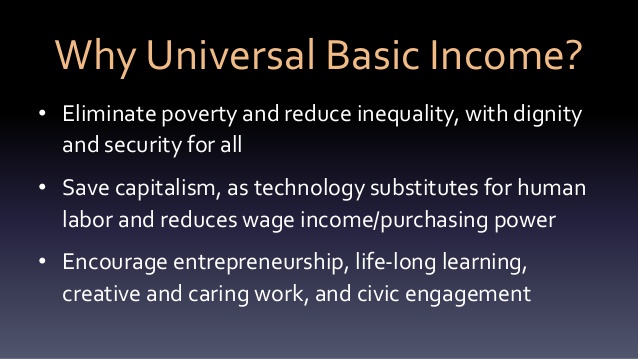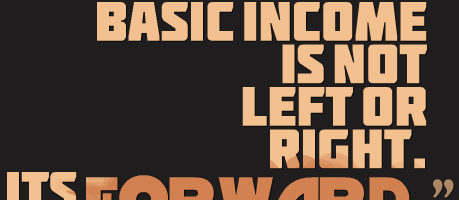More and more, people are considering the possibility of a Universal Basic Income, a stipend received by all adult citizens which insures they can pay for their basic needs. Thomas Paine was one of the first to propose the idea, followed by the likes of Martin Luther King, Richard M. Nixon, and now Mark Zuckerberg, Richard Branson, and Elon Musk. It just makes common sense to me that since the entirety of our monetary system has been fabricated so that the game of finance has overtaken the world, I figure that if you’re going to force people to play the damn game, the only fair thing to do is give them ample chips with which to play.
 People aren’t naturally born into money. Though some are born into it and are given vast swaths of land that are passed down from generation to generation, for most of us, we come into the world with nothing. As humans, we’re not born into the free market, we have to buy our way in. It’s a lot harder to buy in when all of the currency is being hoarded. In order for a currency to work, it has to flow, not sit sedentary.
People aren’t naturally born into money. Though some are born into it and are given vast swaths of land that are passed down from generation to generation, for most of us, we come into the world with nothing. As humans, we’re not born into the free market, we have to buy our way in. It’s a lot harder to buy in when all of the currency is being hoarded. In order for a currency to work, it has to flow, not sit sedentary.
Now if the person who is born into it, or who buys into it through hard work and strategy, wants to ensure that all of the people living on the land he legally owns are creating a financial stream for him, well, then he’s gotta realize that in order for the stream to flow, he’s the one’s gotta open the dam. So he takes that wealth that he’s stored up, passes it out to the people who need it to play the game, and then he gets to have fun watchin’ how it comes back to him. The problem is that quite a few of ’em fear that it won’t.
But for those who have some sort of faith in whatever has provided for their wealth, privilege, and every single breath up to this point, they have an opportunity to actually create something very profound.
Since it is far-reaching to assume that wealthy would ever feel rich enough to give their money away, the question does remain… how do we pay for it? Some have proposed a wealth tax, meaning that an extra 1-1.5% tax is placed upon those who make over a million dollars, but we could also redirect some of our debt-based military spending.
Presently, people across the economic spectrum pay taxes to the federal government, some more than others for various reasons, and that money’s still not enough to pay for all of the bombs we hope to not use, missiles we feel compelled to fire, and bullets it takes to protect us from those who want to harm us due to all of the bombs, missiles, and bullets we shoot. So the federal government goes to the finance corporation, and the Federal Reserve Bank does its magic and creates a few billion dollars out of thin air to loan the government so it can keep chuggin’ along and makin’ noise. Wouldn’t that money be better invested if it actually went directly to the people so that it could empower a free market instead of enabling a wasteful government?
Of course, we don’t necessarily have to go to the Federal Reserve Bank to ensure that everyone has enough capital to pay for their basic needs of food, shelter, and healthcare. Technology has afforded us the possibility of using bitcoins, etherium, time dollars, or a number of other currencies through which we can alleviate the burden of poverty that comes with an overly competitive economic model. If we want to move toward a collaborative economic model, where a community’s resources are managed in a way that does not necessitate human suffering, we’ll need to move away from debt-based fiat currencies eventually anyway.
Some fear that people would stop working, and they are probably right. Critics of the Universal Basic Income cite the number of people in America being paid to be unemployed right now, and don’t have much impletus to go out looking for a job. Of course, a Universal Basic Income isn’t an unemployment check, and it’s not paying them to be unemployed, it’s merely a recognition that each of us is a human being and worthy of life and appreciation, not merely a means of making money.

Considering how much we’ve become accustomed to working and been trained to attach that to our definition of human character, we’ve created a society that is dizzyingly busy because all of the work we have to do. Since a lot of what we do is actually really harmful to the planet and creates a lot of waste, and since robots are now taking over a lot of the menial human jobs, maybe it’s a good time to reconsider how much work humans actually have to be doing, and give people the opportunity to decide how fully they want to live.
Most will want to go feel the fulfillment of working some sort of job, just to have something to do, and more importantly, they still have the capacity to make more money and create a better life for themselves. Many will have time to devote to education or civic and community endeavors. For those who don’t, at least they won’t be running around unnecessarily seeking survival or pretending to be something they’re not. They can sit in their room and stare at the wall all day. It really won’t hurt anybody as much as we might imagine it will, any more than it already does anyway.
Like all advances, there are still those who may say it can’t or shouldn’t be done, and those who say it can’t be done on a universal scale. There are others who say its time has come, and with the proliferation of automated jobs coming down the pike, it is ultimately unavoidable.
If we can put our monetary system into perspective and stop cracking our whips to force people into work, we may get a glimpse of Dr. King’s vision of it.
“The contemporary tendency in our society is to base our distribution on scarcity, which has vanished,” wrote Dr. King, “and to compress our abundance into the overfed mouths of the middle and upper classes until they gag with superfluity. If democracy is to have breadth of meaning, it is necessary to adjust this inequity. It is not only moral, but it is also intelligent. We are wasting and degrading human life by clinging to archaic thinking.
“The curse of poverty has no justification in our age. It is socially as cruel and blind as the practice of cannibalism at the dawn of civilization, when men ate each other because they had not yet learned to take food from the soil or to consume the abundant animal life around them. The time has come for us to civilize ourselves by the total, direct and immediate abolition of poverty.”
But don’t take my word for it, here are 9 samples of what the good folks at TED had to say about it…

